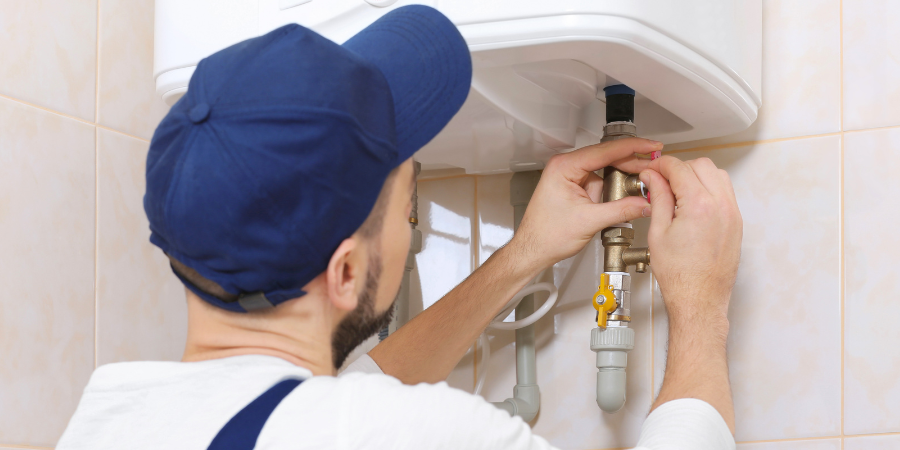When it comes to modern plumbing solutions, tankless water heaters are a popular choice for their efficiency and convenience. However, like any home appliance, they can encounter problems that require troubleshooting. Understanding these potential issues and how to address them is crucial for maintaining a reliable hot water supply in your home.
In this article, we will explore common problems that tankless water heaters face, their causes, and some practical solutions. Tankless water heaters are a viable solution for any homeowner, but they are especially valuable in smaller homes, multi-family buildings, or for those looking to access unlimited hot water regardless of the demand.
What Is a Tankless Water Heater?
A tankless water heater, also known as an on-demand water heater, provides hot water only when needed, without using a tank to hold it until needed. These systems heat water directly as it flows from the water supply line through the unit, resulting in a constant supply of hot water.
Advantages
Tankless heaters offer many benefits from eco-friendliness to cost effectiveness. Here we will take a closer look at why one might consider changing from a tank-style heater to a tankless model.
Energy Efficiency
Tankless water heaters are more energy-efficient than traditional tank water heaters because they eliminate the standby heat loss associated with maintaining a tank of hot water. This efficiency translates into lower energy bills, which is a common goal for many homeowners. The reduced energy consumption means fewer fossil fuels are used, and thus, fewer greenhouse gases are produced, leading to a smaller carbon footprint.
Longevity
With proper maintenance, tankless water heaters can last significantly longer than traditional tank heaters. Their lifespan can extend up to 20 years or more, compared to about 12, making them a sound investment for homeowners.
Space Saving
Tankless water heaters are compact and can be installed on walls or in tight spaces. This space-saving feature is particularly beneficial ito those living in tighter conditions where every square foot counts. Their compact size also allows homeowners who desire dedicated heaters more options for installations.
Safety
These systems have advanced safety features that reduce the risk of overheating and potential water damage. They also eliminate the threat of a storage tank rupture and the associated flooding common to traditional water heaters.
Better Water Quality
Because tankless heaters operate without a storage tank, there is less risk of rust and scale build-up contaminating your water supply. This ensures cleaner and fresher water for household use. Foul odors and discoloration are eliminated when a tankless heater is installed.
Common Problems
As can be seen, tankless water heaters boast many benefits however, they are not without problems. Here, we will cover the top six issues often associated with tankless water heaters.
Mineral Deposits
Hard water can lead to the accumulation of mineral deposits inside the tankless water heater. This build-up is caused by hard water minerals such as calcium and magnesium and can affect the unit’s efficiency and lifespan.
Ignition Failure
Ignition failure can occur for gas-powered heaters for a variety of reasons. Gas supply issues are common and can occur because of an interruption in service from the gas supplier or a blockage in the gas line. A dirty burner can also contribute to failed ignition.
Water Is Too Hot
If the water temperature is too hot, it can be due to incorrect thermostat settings or a malfunctioning temperature sensor. Issues such as these are easily detected and corrected with an inspection of the system.
No Hot Water
The absence of hot water can be attributed to problems such as a blocked vent, a tripped circuit breaker, or a failed heating element. Venting is extremely important to keep the system in operation, and even a dirty air filter can shut down a tankless heater to avoid overheating.
Low Pressure
Tankless water heaters can sometimes deliver low water pressure due to several factors. One common cause is the accumulation of mineral deposits within the system, which can clog the internal components and restrict water flow. Additionally, a clogged or dirty inlet filter can impede the amount of water entering the unit. Issues with the water supply, such as low municipal water pressure or partially closed shut-off valves, can also affect the performance of the heater.
Leaks
Leaks in tankless water heaters can pose significant issues for homeowners. They often stem from faulty connections or fittings, which may loosen over time from general wear and tear.
Corrosion within the unit, particularly in areas with hard water, can also lead to small perforations in the heat exchanger or other components, causing water to escape.
Additionally, high water pressure can strain the system and create leaks at vulnerable points. Leaks not only waste water but can also lead to water damage and mold growth in the surrounding area.
Prevention
To protect a tankless heater there are options homeowners can take advantage of from purifying the water before it reaches the heater and enrolling in ongoing inspections and maintenance plans to keep the heater in top condition.
Water Softening
Installing a water filtration system can reduce the amount of minerals entering your tankless water heater, thereby preventing build-up of sediment and prolonging the unit’s lifespan. The softener either removes the hard water minerals or suspends them so they are unable to leave destructive deposits behind.
Inspections And Routine Maintenance
Regular maintenance is essential to keep your tankless water heater in top condition. This includes annual inspections, cleaning filters, and a yearly descaling of the unit to prevent mineral build-up.
Looking To Improve The Operation Of Your Tankless Water Heater?
Understanding the common problems associated with tankless water heaters and how to troubleshoot them is crucial for maintaining a reliable hot water supply. By addressing issues such as mineral deposits, ignition failure, and leaks, you can ensure your tankless water heater operates efficiently and lasts longer.
At OVC Plumbing and Drain, we are committed to helping you maintain your tankless heater as well as your home’s entire plumbing systems. If you encounter any issues with your tankless water heater, our team of experienced plumbers is here to provide professional assistance. Regular maintenance and proper care will keep your water heater running smoothly, providing you with endless hot water for years to come.
If you have any plumbing needs or would like to schedule a maintenance check for your tankless water heater, contact OVC Plumbing and Drain today. Our experts are ready to assist you!






